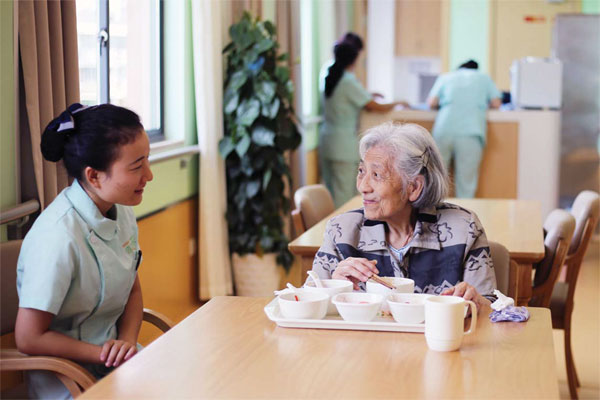Elderly-care service calls for young talents

An undated photo shows an elderly woman dining at a nursing home in Hangzhou, East China's Zhejiang province. [Photo by Sun Yidou/For China Daily]
With her ponytail neatly tied, Zhang Chengxiang exudes a capable demeanor and she smiles a lot. Born in 1998, Zhang is now the director of a nursing home in Nanchang city, southeast China's Jiangxi province.
After graduating with a degree in elderly services and management in 2020, Zhang worked in the Jishanzhijia Elderly Care Group. "Because I'm diligent enough, I worked my way up to become the director," Zhang said.
Growing from a nursing assistant to an assistant director and now the director of the elderly care home, Zhang observed that elderly care requires not only patience and meticulousness but also the ability to manage and adapt to complex situations.
Today's elderly care industry is attracting more high-level young professionals with diverse educational backgrounds.
Ji Jialin joined SDIC Health Company in 2021 as an operational manager at the Caihongwan Senior Welfare Institute in Shanghai.
Ji has an undergraduate degree from Peking University's School of Nursing and a master's degree in health management from Peking Union Medical College. Experienced in medical and health practices, she a is qualified to manage the nursing home.
Tang Heming, who joined SDIC Health Company less than three months ago, is a graduate student in public health at Brown University.
"The elderly are a very vulnerable group," Tang said. During her graduate studies, she conducted in-depth research on the reading comprehension of health insurance terms among US medical students.
"Many people with medical backgrounds have difficulty comprehending complex insurance terms. How can we ensure that vulnerable groups, such as the elderly, understand these terms and protect their interests?" Tang said.
Tang's colleague Gao Zeqing is a Fudan University business administration graduate, who conducted numerous field surveys on the elderly during his academic years.
Having worked in the elderly care industry for over one year, Gao discovered that many elderly care institutions need to be further standardized and informationalized. Elderly care models also require innovation, which provides promising opportunities for young people.
Focusing on the rapid growth in demand for elderly care, Fan Shiming, a PhD candidate at the Research Center for Social Security at Renmin University of China, pointed out that the surging needs proposed by elderly care are calling for more talents to join and develop the elderly care service industry.
Data suggested that from 2022, the elderly population in China aged 60 and above is 280 million, accounting for 19.8% of the total population. Among them, the population aged 65 and above is nearly 210 million, constituting 14.9% of the total population. However, the number of elderly caregivers is only 322,000.
Fan emphasized that the elderly care industry should provide young people with a fundamental career development path and help practitioners to prepare for their future development. "This is essential to increase young people's enthusiasm to enter the elderly care industry," he emphasized.
Source: China Youth Daily; trans-editing by Guo Yao








